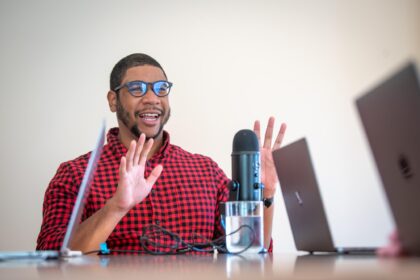Challenge. Change. Podcast
From Bard to banned
 When English Professor Justin Shaw teaches Shakespeare, he encourages his students to use the playwright and poet’s works as a vehicle to analyze relationships and power structures. As Shaw prepares these lessons for his Clark classes, he’s watching teachers in the southern United States drop texts like “Romeo and Juliet” from their curricula because of legislation restricting the use of literature with content that could be deemed sexual. Libraries and classrooms have also been subject to book bans targeting titles that address topics of race, gender identity, and sexuality.
When English Professor Justin Shaw teaches Shakespeare, he encourages his students to use the playwright and poet’s works as a vehicle to analyze relationships and power structures. As Shaw prepares these lessons for his Clark classes, he’s watching teachers in the southern United States drop texts like “Romeo and Juliet” from their curricula because of legislation restricting the use of literature with content that could be deemed sexual. Libraries and classrooms have also been subject to book bans targeting titles that address topics of race, gender identity, and sexuality.
“The powers that be in these political entities want us to stop talking about Shakespeare as anything other than the white, straight cultural power,” Shaw said in an interview recorded during Banned Books Week, which highlights the value of free and open access to information.
“Being open to the changing nature of language, identities, and the ways that we interact with the world is something I bring into our discussions of Shakespeare,” he said. “These discussions happen today, but guess what? They’re wrestling with the same issues in Shakespeare’s time, too. They’re wrestling with how to talk about race. They’re wrestling with how to talk about sexuality. They’re wrestling with how to talk about class and religion.”
Shaw is among the editors of the forthcoming “Inclusive Shakespeares: Identity, Pedagogy, Performance,” which responds to a growing movement to make Shakespeare studies inclusive to audiences historically marginalized in relation to Shakespeare’s poetry and plays.
Challenge. Change. is produced by Andrew Hart and Melissa Hanson for Clark University. Listen and subscribe on Spotify or Apple Podcasts. Find other episodes wherever you listen to podcasts.


